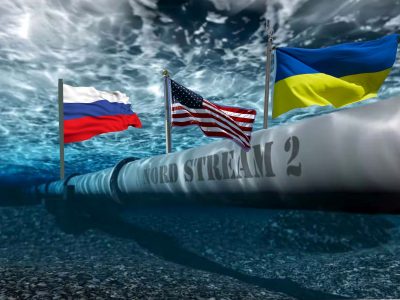We’re still not certain who perpetrated the mysterious explosions that damaged the undersea Nord Stream 2 pipelines last year, but a recent report indicates that a Ukrainian group was responsible. If so, this was a grave mistake — but there could still be some serious spy games going on here.
While details are still unconfirmed, The New York Times reports that recent intelligence indicates a pro-Ukrainian group, not operating under the direction of any Ukrainian officials, led the attacks last September. Given the West’s support of Ukraine, the details seem the stuff of fiction.
German investigators have linked the attack to a rented commercial charter yacht, a 50-foot sailing vessel that was presumably used as the dive boat for the attacks. These seem shockingly simple for such an impactful operation.

This also throws into question earlier speculation that only a state acting in an official but covert capacity is capable of successfully causing the damage. Just six men initially rented the yacht, although more could have joined later on in the trip.
The most-felt effect of the damage to the pipeline, which carries gas from Russia to Germany, was an increase in oil prices. Europe had to endure limited heat during the winter months in the wake of these price surges. Worse, the benefits of those price surges went to Russia, which happily enjoyed an economic boost amid sanctions when oil spiked.
Though Europe is dependent on Russia for oil, the continent considers this hardship worthwhile in order to stand strong with Ukraine against Russian militancy. By remaining steadfast, Europe can retain strong ties with an ally and not enable future aggression on the part of Russia or another power engaging in brinkmanship.
However, if a Ukrainian group created or added to those hardships, it would create bitterness and resentment, regardless of whether Zelensky and other Ukrainian official leadership authorized the attack. Europe would probably still stand with Ukraine, but less firmly.
Ukrainian culpability could even lead to reduced support for their war efforts. Though Europe still does not want Ukraine to lose and have Russia gain a firmer foothold on the continent, this tarnished relationship could remain strained even after a Ukrainian victory and even indirectly lead to future Russian attacks on an unsupported Ukraine.
As such, if Ukraine really did authorize the attack, allow it to happen or fail to condemn it, this was a big mistake. Ukraine may think Europe feels obliged to back them in order to oppose Russia, but if animosity grows toward key parts of their support, the alliance is bound to erode one way or another.
So, why would Ukraine carry out or allow the attack? Perhaps the idea was to nudge Europe to seek alternate access to oil, which it has done to some extent amid ramped American production. Alternatively, the goal could have been to break some of the ties between Germany and Russia in particular. In either case, the complications appear to have outweighed the benefits.
Still, one has to wonder whether there might be something deeper and more nefarious at work here. Fingers were pointed in every direction as an initial reaction to the blasts. Putin, for example, recently blamed the United States. Of course, everyone is denying culpability, but that’s par for the course.
Given that this operation would represent such a blunder by Ukraine, however, could it actually be that the responsible party remains unknown? The attack would make far more sense if perpetrated by Russia or even the United States, as Putin suggested. Russia would benefit from the increase in oil prices, and the United States would benefit by redirecting European energy dependence onto itself.
Neither party, naturally, could ever acknowledge involvement. It would be far too toxic in terms of relationships, which is what makes it an ideal scenario for a false-flag operation. Russia has a reputation for being far more ruthless and devious, but the United States has also engaged in its share of misdirection.
What would make the most sense is a Russia-directed attack, perpetrated by Ukrainian nationals with Russian allegiance in order to displace blame onto Ukraine and weaken their bond with Europe. Ultimately, this is pure speculation, but what else is international intrigue for?



























































































































george boag • Mar 27, 2023 at 5:22 pm
Seymour Hersh actually has a more plausible theory he published in February. US Navy divers working with the CIA used a NATO training exercise as cover to set the explosives that were later detonated remotely.
John Sand • Mar 31, 2023 at 9:27 am
Hersh, an 85-year old blogger, used completely anonymous sources. It’s impossible to say whether there’s any truth to his work, because he works with no editor, and–let’s face it–is approaching the age range where the human brain starts to go.